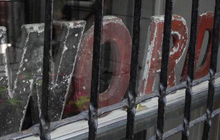Fran Lebowitz On Reading
I’m not a collector. I don’t care about things like that. I not a collector because I’m not that organized. I’m not grown-up enough to collect things, but I have acquired a stellar collection of odd books, weirdo books, books that don’t fit easily into categories.
I have a very small but choice collection of books about the Masons, the Odd Fellows and the Elks. I particularly like Odd Fellows books. They’re a little harder to find. The thing about the Odd Fellows is really curious. I was trying to figure out whether there still are Odd Fellows. You don’t hear about the Odd Fellow much any more. I looked them up in the telephone book here but I guess in New York you don’t need a separate listing for Odd Fellows.
I have a book called Take My Gun If You Dare, which is about the right to bear arms. That’s one of my miscellaneous, ludicrous books. Last month I was at Powell’s in Portland and picked up a great book called The ABC’s of Beekeeping. I don’t care anything about beekeeping, just liked the way the book looked, I liked the pictures.
So many things I have defy category. I have a book called The Gourmet Handbook of Cigars that tells you what cigars to have with what food, what cigars go with what brandy, what cigar goes with what you’re wearing, what size cigar compliments the size of your hand.
I keep everything I buy. Only occasionally do I buy a book by mistake. Someone recommends it to me and I buy it and it’s horrible. I don’t keep books that I don’t like. In my mind there are real books and not real books. Real books are books that I like and not real books are junk that other people recommend to me. I don’t believe it’s taste, I believe they’re wrong. People tell me they’re good and they’re not.
I collect Emily Post. I think I have everything of hers but I don’t keep up with the revised editions. I have a book called Manners for the Millions, which is a manual for immigrants to the United States. Emily Post may tell you how to properly address a Colonel, this tells you not to wipe your nose on your sleeve.
I’ve got my children’s textbooks, some really funny ones, and about five or six children’s encyclopedias. They’re not that hard to find either. You often find them where, say, A is missing.
I was once in Cleveland on a book tour and a bookshop there had just bought the library of a parochial grammar school and they were selling the books for ten cents a pound. There were these big meat scales. I went crazy. This was at the time my first book came out and I lived in this little apartment on West 4th Street that barely had a door, let alone a doorman, so I sent them to my agent and forgot to tell her. They sent them something less than book rate so that three years later I got a call from I.C.M. saying all these cartons of books had arrived for me. For about thirty dollars I bought eight thousand books.
I don’t really collect these books, I just buy them. Particularly one’s from the fifties, when I was a child, not valuable ones. It’s nostalgia for the last time I was prolific.
You know, Jews, when they drop a prayer book are supposed to kiss it. This is what they teach you when you’re very little. It seemed entirely reasonable to me that you would do that. When I was a child I would kiss any book I dropped. When I was a very little child after I’d read a book I really liked I’d kiss it. Love is really the word. I think Children’s books are a human emotional experience rather than an intellectual one. You have a human relationship with them. Children have emotional relationships with inanimate objects which it would be wise to carry on into adulthood. The way a child makes a person out of a doll, which I never did, I made people out of books.
When I was a child I read a lot of my mothers childhood books. Instead of having the consciousness of a child of the fifties I had the consciousness of a child of the thirties. There was a series of books about twins from different countries; not only different countries, there were The Cave Twins, The American Colonial Twins. The idea was to show children how children live in other places. There was no real story. Just to tell you about the customs. I like these books a lot. People must collect these because whenever I see them they’re selling for amazing prices.
You ask any woman what her favorite book was as a child, I think everyone would say A Secret Garden. For me it was Nancy Drew. That’s addicting. When I was about eight years old I had my eyes operated on and I was blind for two weeks. My mother sat by my hospital bed and read me a Nancy Drew book every day.
Of course, now they’re so out of time. Even in the ’50’s they had a sort of ’30’s flavor to them. I’ve read them since and they’re bizarre. She had a lesbian character, not that she ever said so, named George. She’s described as boyish, has short hair, and her best friend and cousin, whose name is Bess, is described as round, very feminine, plump.
In Catcher in the Rye, Holden Caulfield writes about his sister who’s writing a mystery about a girl detective whose father was a tall attractive grey haired gentleman of twenty. Obviously, to any girl, it’s Carson Drew, who was the father of Nancy Drew. I also, when I was about eight or nine, wrote a mystery that owed quite a bit to Nancy Drew.
My mother was a big bookworm. Not a bibliophile. My mother got me into what has been for my entire life certainly what could be called my drug addiction: the reading of detective stories. I read five or six a week and must have eight billion of them. I used to give them away, or throw them away, but for the past seven or eight years I’ve kept them. When I get my house in Italy, which I have been expecting momentarily for the past fifteen years, I’ll have a whole room of these and people can have their choice of any of these eight billion.
So I don’t give them away anymore. I keep them. I’m the only person I know who reads mysteries like this who does not care who did it. I don’t read them for the mystery, I don’t read them for the game or the puzzle. I think of them more as an eating experience than as a reading experience. I suppose I read them for the atmosphere or the characters but I read them like a drug. I read them instead of taking heroin.
I like hard boiled detectives. I really don’t like the English. If I see the word Don and it’s not someone’s name, I’m out of there. Nero Wolfe is one of my favorites because I love to read about food. I also collect cookbooks. I don’t know how to cook but I know how to eat. I’m a glutton. John McDonald is another one of my great favorites. When my first book was published in paperback it was with Fawcett and I guess I told the publisher how much I liked him. I guess she told him because he wrote me a letter and told me how much he liked my book. I was thrilled. They made me an honorary member of the John McDonald Fan Club, with the badge, certificate, and everything. The Travis McGee’s are the best.
I liked Robert Parker before he became a social worker. Elmore Leonard. I even like his bad ones. I think Joseph Hansen’s the best living detective writer. The Dave Brandstetter series. The detective is a guy whose father owns something like Metropolitan Life Insurance, a zillionaire. The son is gay and he’s the detective. He’s a death claims investigator.
Hansen stopped writing them about five years ago but I still think he’s far and away the best. There was another series of gay detective stories that were quite good by a guy whose name I can’t remember. They were all named with a color, but a very particular color like slate. They were all like the colors that they list at fashion shows. He had another called Vermillion. There were three or four of them and then the guy just stopped writing and disappeared. I don’t know what happened to him. I never read spy books. Spy books are for boys.
I love trash. I like Jacqueline Susann and the early Harold Robbins. I love Jackie Collins. I once saw a presentation copy of one of her books in my agents office that was leather bound with leopard print endpapers and I begged for it. I begged for it and he wouldn’t give it to me. There aren’t many writers who do that kind of thing that are good at it but Jackie Collins is good at it.
I have a pornography collection. It’s not a huge one. The really good stuff is too expensive for me. I wrote some for a company called Midway Press. They would give these stapled pages that told you how to write one and what had to be in each book. They paid you five hundred dollars for a book and that’s it.
The first one I wrote myself and it was called House of Leather. I published it under the name of the headmaster who threw me out of prep school, Robert Paine Cook. Then I wrote two or three others with about five people. We would get stoned, we would talk, and somebody would type. There were so many people involved you’d end up getting like seventy-five dollars. It was really boring and it was really bad. My copies of these books are gone and I’m not looking for them. I have a finicky aversion to buying second hand pornography because I know where it’s been.
I would say that if I collect anything literary I collect O’Hara first editions, not that they’re that hard to find. Each printing was about eight billion. O’Hara is a really important American writer and a really overlooked one. There were two reasons he was never considered that way: one, he wrote so much, and, two, he was so popular, he made a lot of money.
Every single person I know who knew him, and there are quite a few, loathed him. He was probably such an unlikable person that nobody could judge him that way in his own era. My editor, for instance, knew him and we’re constantly battling, because he thinks I way overrate him and I say that’s because you knew him. So, he was a jerk. Except for pornographers, I think he’s the only writer who writes about sex in a way that it’s possible to read about it. I think John O’Hara’s the real Fitzgerald. O’Hara’s a cause to me. I have every single thing that he wrote.
About three years ago I found a book of his I never even knew about called Lovey Childs. It was obviously a short story that someone stupidly suggested he turn into a novel. It doesn’t really work but it’s interesting. I found it in a second hand store in Venice, California and I called Joe Fox, my editor, and I said do you know this book? He said there’s no such book. I said, I’m holding it in my hand, you published it — I don’t mean Joe himself but Random House — and you don’t know it? It’s a pretty scandalous book, a lesbian novel. It’s slight but it’s interesting.
I don’t know which is my favorite book of his. We had O’Hara books in the house. My mother must have liked him. He was so popular then. Everyone had a couple of copies of his books. I’ve owned a copy of Cape Cod Lighter since I was a child and only two years ago I found out what one was. I was at the house of an older man who teaches poetry at Harvard and he asked me to help him start a fire. He said, use that Cape Cod lighter, and I was thrilled. A Cape Cod lighter is a thing you light a fire with. I was just stunned. Initially, I’d never even thought what it meant. I don’t know what I thought.
I still have my copy of Howl, that little pamphlet published by City Lights. When I was twelve or thirteen I wanted to be a beatnik as if it were a profession. It kind of sticks with you. When my first book came out, and I was twenty-seven, I went to sign books at City Lights in San Francisco. The whole window was my book. I was so thrilled. Nothing could have made me happier than that. I felt incredibly accomplished.
City Lights, Grove Press, New Directions: publishing houses used to have a real sensibility to them. Each publishing house had its own character. Now they have none at all. To have one of those little publishing houses now you’d have to be a billionaire. Rich people used to dabble in that sort of thing. Now they don’t even bother. You used to have this sort of high quality rich person that was interested in that sort of thing and now you don’t. We have plenty of rich people, more that we need in fact. We have a big surplus of those people but they’re not interested in books or writers or writing.
I read contemporary novels but not with much pleasure. The last novel I liked was A Case of Curiosities, which surprised me because it’s a historical novel. Contempt would be the word that best defines my feelings for the historical novel. The outstanding example of middle-brow literature would be the historical novel.
I don’t know why I bought this. I don’t like historical novels for a number of reasons. First of all, they’re in the province of the third rate. People read them to learn things, as in James Michner. I think a real writer writes about his own life.
I reread Edith Wharton. I’m a big Henry James fan. A lot of people aren’t but I am. Flaubert. Proust. When I was a little girl, about twelve, my little sister gave me Swann’s Way as a birthday present. My sister was about eight. I’d never heard of it. I started to read it and I didn’t understand it at all. It was in English. I kept reading it and reading it and didn’t understand but I forced myself to read through the whole thing. Hadn’t a notion of what it was about. But without one second of comprehension I read it. I asked her why did she buy me this book and she said she chose it because it looked like the kind of books I liked. I don’t know what that meant.
When I was about seventeen I read it again with about ten percent comprehension. Then I read it in my twenties. I last read it when the Kilmartin edition came out. I didn’t know whether it’s a much better translation or whether I was just ready for it. I am not going to re-read both of these translations to make that distinction but it seemed to me much better. Now it’s being translated by Richard Howard and I’ll read that. His translation of Baudelaire was the first time it ever really made sense to me.
The first time I read Madame Bovary I read it in the Penguin edition — which is a terrible translation — and I didn’t think it was that great. Then I read the Steegmuller translation and it was a really good book. I hesitate to say what writers I like best when I’ve read them in translation as I never feel like I’ve read them. I don’t speak another language so all the French writers, the Italian writers, the German writers, I don’t feel like I know them in a real way.
Having been through the experience of having my own books translated I know they can’t even come close. I worked with a Japanese translator on my second book. After spending a day with her I said, You know, you’re not even asking what the word for this is, you’re asking me what is the thought for this. It’s too distant. Too different.
There are certain great writers I don’t read with pleasure and Joyce is one of them. I read Ulysses when I was very young and I forced myself to read it, which is something I don’t do anymore and haven’t done for twenty years. I read for pleasure and if I’m not having fun I close the book.
Faulkner’s another one. I tried to read him when I was young, didn’t enjoy it, and never tried again. Southern writing doesn’t strike a cord in me. I like Eudora Welty and Flannery O’Connor but I don’t love them. The same goes for all those South American writers, except for Borges who I think is really interesting. I don’t love Marquez. People recommended him to me for years, I wouldn’t read him, and when I did I was right.
Hemingway I dislike. Hemingway, to me, is fraudulent. He may be too much of his time, which makes him not a great writer. It doesn’t matter when a great writer wrote. He changed writing but that doesn’t make him a great writer. You don’t think about the time when you read Flaubert or Shakespeare. He’s still read because people read him in school. I think that a writer that inspires you to fish instead of to write or read is not a great writer.
I love Upton Sinclair and Sinclair Lewis. All the Lanny Budd books. I recently gave away my copy of Upton Sinclair Presents William Fox, his biography of the man who started 20th Century Fox. He wrote some really weird books and published them himself.
Sinclair Lewis. Particularly Main Street. I thought that was a work of great genius. I think that particularly for a child it’s a great book. It’s a child’s idea of great literature. It’s a good introduction to real books. I think probably for an adult it’s a child’s idea of great literature as it doesn’t hold up.
As a child, reading Twain changed my life. After the age of twenty it is almost impossible that a book can change your life. That happens when you’re a child. Just like that City Lights thing, an important thing that happened to me when my first book came out was I got a letter from the Mark Twain Society saying I had been elected a Daughter of Mark Twain. I was extremely impressed by this.
Terry Southern is one of my heros. Blue Movie is really my favorite. He’s unknown to people younger than us. I speak at colleges all the time and whenever they ask me who is funny I say Terry Southern and get six-hundred blank stares.
With Thurber, you always laugh. I was thrown out of class — it must have been the third grade — because I was reading The Night the Bed Fell In behind my geography book and I was just hopeless with laughter. I couldn’t stop laughing even when my teacher was yelling at me. I was scared of my teachers as a child. It wasn’t like I was some belligerent student. I was just having a fit. I couldn’t stop laughing. They sent me to the principal’s office and as I walked down the hall, to my certain doom, I was convulsed with laughter. He is certainly, absolutely one of my favorite funny writers.
Dorothy Parker makes me laugh, always. Her book reviews. People really slight her because she was so dissolute, she hardly wrote, she was a drunk. I think if someone can write a book review of a popular novel published fifty years before you read the review, and you laugh every time you read it, that person is remarkably talented. Oscar Wilde. Firbank is so extremely precious, very funny and stylish, but Oscar Wilde is a genius. There’s quite a difference there.
Everything is disappointing to those who read a lot. There’s no question that at no time in my life have I ever thought that life was as good as reading. And I haven’t had a bad life. What’s unusual about me is that most people I know who read to the extent that I do aren’t as precarious as I am.
I am additionally a lounge lizard of tremendous proportion. It isn’t that I don’t enjoy, I do. But I would rather read than have any kind of real life, like working, or being responsible. Reading prepares you for other reading, and possibly for writing, but, I’m happy to say, it certainly has nothing to do with real life. All the things that I never did because I was reading, so what? If someone said to me, how did you spend your life? I’d have to say, lying on the sofa reading.
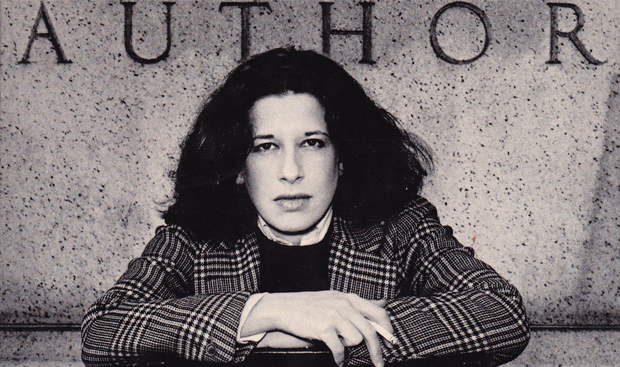
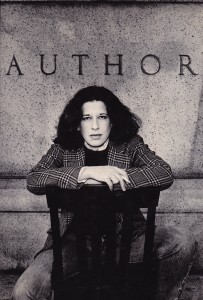
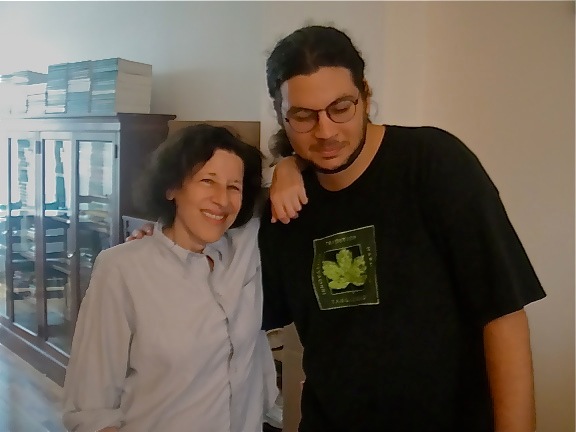
 Jumel Terrace B&B
Jumel Terrace B&B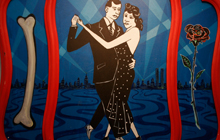 Life Turns Man Up & Down
Life Turns Man Up & Down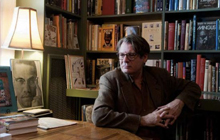 The Private Library
The Private Library